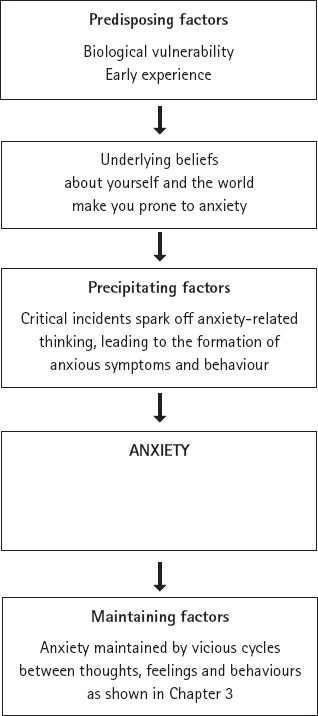
4 |
Why your anxiety persists |
I have suffered from anxiety ever since I can remember. I ask myself, ‘Why me? What did I do to deserve this?’
Lorraine, 49
When people have a problem, particularly a serious one like anxiety, which causes great distress and interference in their lives, they naturally want to understand why they have it. In order to help with this we will talk a little about the development of anxiety before we go on to talk about why it persists.
With any kind of psychological problem, it is helpful to think about three levels of cause.
Firstly, we can talk about ‘predisposing factors’. These are the things that might make you vulnerable to anxiety. There are two main types of predisposing factor: physical and environmental (sometimes known as nature and nurture). There seems to be some evidence that anxiety is inherited, and that some people have genes that make them vulnerable to anxiety. Anxiety does run in families, though of course this may be as much to do with the effect of growing up in that family as of the genes themselves. Being brought up in a difficult or insecure environment can make you more vulnerable to developing anxiety problems as you grow up. This may be partly because difficult early experiences lead you to develop an underlying ‘mind set’ of beliefs that make you prone to anxiety. Examples of such underlying beliefs may be ‘the world is dangerous; people will attack me if they think I’m weak’.
Secondly, we can talk about ‘precipitating factors’. These are the triggers in your life that set the anxiety off. It might be that you were bullied at school or work, or you had a serious illness, or you had financial problems and lost your home. These life events may have a more severe effect if you are already vulnerable to anxiety. They are often called ‘critical incidents’ as they have played a critical role in the development of your anxiety. Critical incidents can spark off underlying beliefs and lead you to interpret things in an anxiety-related way.
Thirdly, we talk about maintaining factors. These are the factors that keep your anxiety going and which are the basis of the vicious cycles in Chapter 3.
To summarise these three factors, some of us may be more vulnerable to develop anxiety problems because of our genetics or our upbringing, but we can all get anxious if life gets difficult enough. Difficulties may be a single particular trigger, like Nicky’s experience of choking, or they may be ongoing problems, like Stefan’s pressure of work and finances. Once we get to this point, we start to interpret things in an anxious way, and we fall into the vicious cycles that keep anxiety going.
It can be very helpful for you to think about what was happening when you got anxious so that you can learn to cope with these difficult situations in a different way. Strange as it may seem, though, it is not actually necessary to know what caused your particular anxiety problem in order to treat it successfully. If you think about it, you do not need to know the cause of a broken leg in order to fix it; neither do you need to know the cause of your child’s tears in order to be able to comfort them. Aspirin works for headaches even if you don’t know why you’ve got one. Regardless of why your anxiety problem started, it is the maintaining factors that keep it going. If we can change the maintaining factors, which are essentially the vicious cycles of anxiety described above, we can change anxiety, too.
Figure 4.1: Why your anxiety persists
The CBT approaches described in this book are remarkably successful. Why? Because they focus on what is keeping your anxiety going NOW. Regardless of the earlier cause, research has repeatedly shown that working with the factors that keep anxiety going will help you to recover. Understanding the whole picture does undoubtedly help you to feel more at ease with yourself, but it does not help you overcome the problem. CBT is unique in this respect – it works with what is keeping anxiety disorder going.
In Nicky’s case, understanding how her anxiety problems had started was helpful, but it was not enough to produce change. Sadly, almost no one says, ‘Oh, I get it – that’s why my anxiety developed and now I feel completely better.’ For Nicky, the maintaining factors can be seen in the vicious cycles (see p. 46). By understanding how the vicious cycles made her anxiety persist, she and her supporter could start to make a plan for change.
• If the person you are supporting wants to think about how their anxiety developed then help them by open and honest discussion.
• But don’t get side-tracked for too long discussing how their anxiety started, and help them not to be concerned if they can’t make sense of it at once.
• Try to keep the focus on the ‘here and now’ and on discovering how the vicious cycles maintain their anxiety.